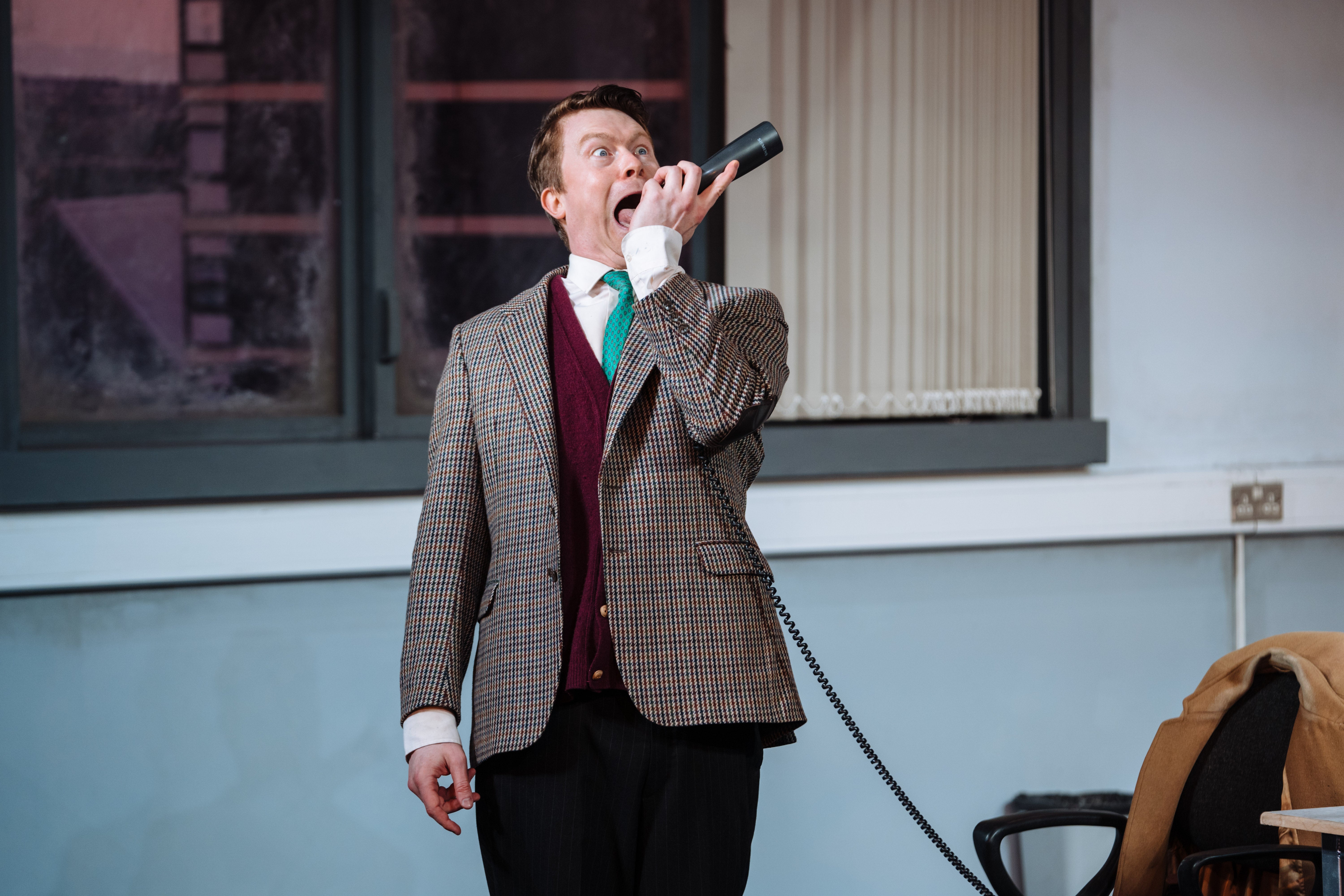Daniel Rigby: ‘Victoria Wood and I would watch MasterChef and heckle Gregg Wallace’
The ‘Flowers’ and ‘Eric and Ernie’ actor tells Ellie Harrison about sending up the police in the revival of ‘Accidental Death of an Anarchist’, his bizarre run-in with the authorities, and his memories of living with the late comedy legend Victoria Wood


A couple of months ago, the actor Daniel Rigby was questioned by the police about a murder. The Bafta-winning star of stage and screen was on the way to Italy to film a new project when five armed officers accosted him at Heathrow airport. “Honestly, my body turned to jelly,” he tells me, leaning forward across the table. “They asked for all of my personal details, to see my phone, what I was doing in Italy, the plot of the film, the scene I was in... it was just so weird and terrifying.”
The police had received a tip-off from the concerned driver who had dropped Rigby off, who had overheard him in the back of the car talking about a killing. Little did they know, the actor was simply going over his lines. But at least Rigby can see the funny side – he weeps with laughter as he relays the anecdote. “I was very shaken up because they had guns!” he says, still incredulous.
The timing of this encounter couldn’t have been stranger. It was two days after Rigby had finished performing in Accidental Death of an Anarchist, a ferocious farce on the British police, at the Lyric Hammersmith. Tom Basden’s revival of Italian playwright Dario Fo’s 1970 play – which has transferred to the West End’s Royal Haymarket after two sold-out runs in Sheffield and Hammersmith – gives the classic a contemporary twist, with its biting, bombastic takedown of the force.
It follows the story of an anarchist who plummets to his death from a police station window. As officers desperately scramble to avoid another scandal, a mysterious man – Rigby’s Maniac – is brought in for questioning. He is an agent of chaos, leading the officers in an increasingly ludicrous reconstruction of their official account, exposing their corruption and incompetence along the way.
With his experience of playing lively eccentrics – think of his failed comedian in Black Mirror’s “The Waldo Moment”, or his desperate inventor in Will Sharpe’s offbeat masterpiece Flowers, or his nerdy wifi whizz in that ever-present 2012 BT advert – it’s no surprise that Rigby has won rave reviews for his turn as the fast-talking Maniac. In Accidental Death of an Anarchist, he leaves the stage just once towards the end of the breakneck two-hour show, morphs into numerous different identities, and at one point wears roughly six layers of clothing.
Rigby himself is a bit of a chameleon. At times during our interview, in the play’s production offices near Leicester Square, the actor has a boyishness to him: he cackles, he cracks jokes, he swings back and forth in his chair. But there are also moments when he is completely still, his back ramrod straight, his posture almost regal, one leg crossed over the other.
While Rigby doesn’t read reviews – “because even in a good one, there’s always something about how awful you look” – he was shocked to hear that there was such glowing praise for Accidental Death of an Anarchist from across the political spectrum of the British press, with critics from left to right, from The Guardian to the Mail, rooting for the show to get a West End transfer.
When we meet, there’s a fortnight to go before the 13-week run begins at the Haymarket. “There is a chance that I might die,” says Rigby, a booming laugh not hiding the anxious tremor in his voice. Rigby hopes people will come away from the show feeling entertained but with a “kernel of anger”. “Dario Fo wrote that he wanted to create a play that inspired laughter, but also wanted to see the smile die on people’s faces as they realise what they’re laughing at,” he says.
There’s no polite way of saying that the police in the play are portrayed as idiots. For them, taking selfies with murder victims is “classic bants”, and lying a “requirement” of the job. When a superintendent concedes: “Of course, some officers will get a bit physical now and then. Some interrogations can get a bit, sure, tasty,” Rigby’s Maniac replies, “Tasty! They’re bloody delicious these days. Use of force has jumped nearly 80 per cent in the past five years!”
But it’s not just about the bobbies in Basden’s script; few sections of British society escape unscathed – whether it’s Suella Braverman and the Tories, the Catholic Church, or even, er, lefty, twentysomething journalists. Not to mention the endless inquiries. “The initial inquiry is over, yes, but that wasn’t inquisitive enough, so now there’s an inquiry into that,” says the Maniac in one of his tirades. “It’s the British way, of course. Inquiries into inquiries into inquiries for as long as it takes for everyone involved to destroy the evidence and change careers. If God were British, there wouldn’t be a judgement day, there’d be an eternal f***ing inquiry.”

“It’s a political piece, but at the core of it, it’s got an honest anger to it,” says Rigby. “People usually take their lanes in the culture war narrative, and so it’s just refreshing to see something that operates with a bit more nuance, isn’t preciously left wing, and takes potshots at champagne socialism.”
The Casey report, in which the Metropolitan Police was found to be institutionally racist, misogynist and homophobic, came out in the middle of the Lyric’s run in March. “That was absolutely extraordinary timing,” says Rigby. “Part of what the play is saying is that this is an absurd carousel and nothing ever seems to change, no matter how many times new commissioners come in and say, ‘Root and branch reform, root and branch reform, root and branch reform.’ But it feels like some sort of crunch time at the moment, because it just has to change somehow.”
As part of rehearsals, the charity Inquest – which works with families whose relatives have died in custody – helped Rigby and the cast to navigate the issue of police brutality with humour. “They said that laughter is a big part of dealing with these cases,” Rigby says, “because some of the contortions that the state can get itself into, in order to justify actions or evade proper scrutiny, can be really absurd.”
The actor is yet to speak to any police about the play – but he wants to. He knows that, among the bad apples, there are many “good officers” who want to see positive change. “But I imagine a lot of them wouldn’t like it,” he says.
Later, he tells me that performing the show is “a real catharsis”, and that “it feels unusual to get to do something so overtly politically charged”. Rigby is a comic actor after all, used to roles in less thorny projects, such as the Sky black comedy Sick Note and the National Theatre’s slapstick megahit One Man, Two Guvnors. In 2011, he was a surprise Bafta winner for his performance as Eric Morecambe in the BBC television film Eric and Ernie, beating both Matt Smith and Benedict Cumberbatch for their roles, respectively, as The Doctor and Sherlock Holmes.

Rigby was stunned. “I remember my body went into a thing where all of my vision clouded and I just focused on Brenda Blethyn’s face in the crowd,” he says. “I was just approaching Brenda Blethyn’s face because that’s all I could see. And then I got [to the stage] and turned to the microphone, and all I could see was what felt like a mass of faces, but then just Stephen Fry’s face. And I don’t remember much. My body went into a similar biological process to what happens when you’re in a minor car accident. I was,” he says, pausing for dramatic effect, “quite rattled.”
Rattled though he was, he managed to give a special thank you to the late British comedy legend Victoria Wood, with whom he had worked on the biopic. He actually moved in with Wood for a while after filming; she knew he’d given up his own flat to do stand-up at the Edinburgh Festival, so offered him a room in her home in Highgate.
I want people to come away from this play with a kernel of anger
“I basically haunted Victoria Wood’s house,” he says, “because I was so shy that I would just lurk around and make her jump all the time. But she was so generous to me. She ended up being a very key friend, really, in my life. And I had aspirations to write, so having someone like that, of unparalleled ability, to talk to about the very thing that they’re incredible at, was just such a privilege. I got to see how she worked at home, as well. For the rest of my life, I’ll never forget the example that she set. The most industrious person I’ve ever come across.”
Rigby says Wood liked to “reward herself with a bit of reality TV” at the end of a day’s writing. “Sometimes we’d watch MasterChef together,” he says. “A lot of heckling Gregg Wallace... It was a really special time. I miss her very much.”
I’m surprised that Rigby describes himself as shy. He is full of stories, all silliness and warmth. “It depends on the context, really,” he says. “That context was an invading-the-home-of-a-national-treasure context.” He puts on a faux-serious face. “Give me half a chance and I can be very, very awkward.”

When I ask if he has anything in common with Donald, the petulant son of Olivia Colman’s Deborah, whom he played in the beautiful Channel 4 comedy Flowers, he quips, “What, the weird, rage-filled freak?” before thoughtfully adding: “Underneath, Donald just really wants to be loved and wants to connect with somebody – that’s why he lashes out all the time. I’m certainly not as aggressive as Donald and I don’t wear so many boiler suits, but I do like connection.”
Rigby is starring in his first musical this autumn, in Lucy Kirkwood’s new adaptation of Roald Dahl’s The Witches. He plays Stringer, the owner of the Hotel Magnificent where the witches hold their conference. But the show could be contentious: the children’s story was at the centre of a censorship row earlier this year, after it was rewritten to remove language deemed offensive.
“Umm, yeah. Hmm. Having an opinion,” says Rigby, chuckling nervously, when I ask him for his thoughts on the debate. “We’re in an age of certainty, but I feel so uncertain about most things... If the aim is to remove all cruel or violent language, that means a different thing to every person,” he says, “so I don’t know where that stops.” He says he will be “singing a couple of numbers” in the production. “I’ve asked to dance,” he says, flashing an impish grin, “but I don’t know whether that’s going to be permitted...”
‘Accidental Death of an Anarchist’ is playing until 9 September at Theatre Royal Haymarket
Join our commenting forum
Join thought-provoking conversations, follow other Independent readers and see their replies
Comments


Bookmark popover
Removed from bookmarks